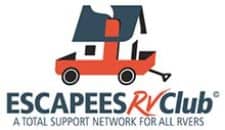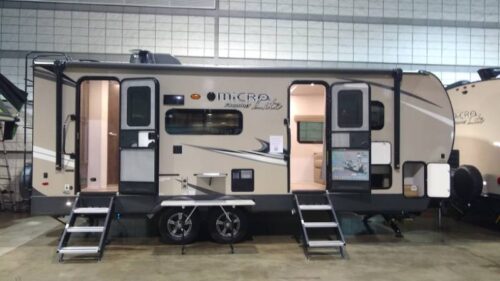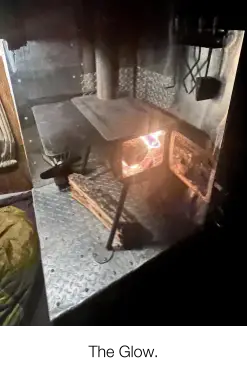If you aren’t living in your RV full-time like we are, you may be wondering; where are you going to store your new vacation home on wheels? Don’t worry, I have you covered. I’ve lived through RV storage sites and at home storage and we’ve researched the rest.
TYPES OF RV STORAGE
- Custom Structures
- In Your Yard
- RV Storage Facilities
- Campgrounds
Custom Structures
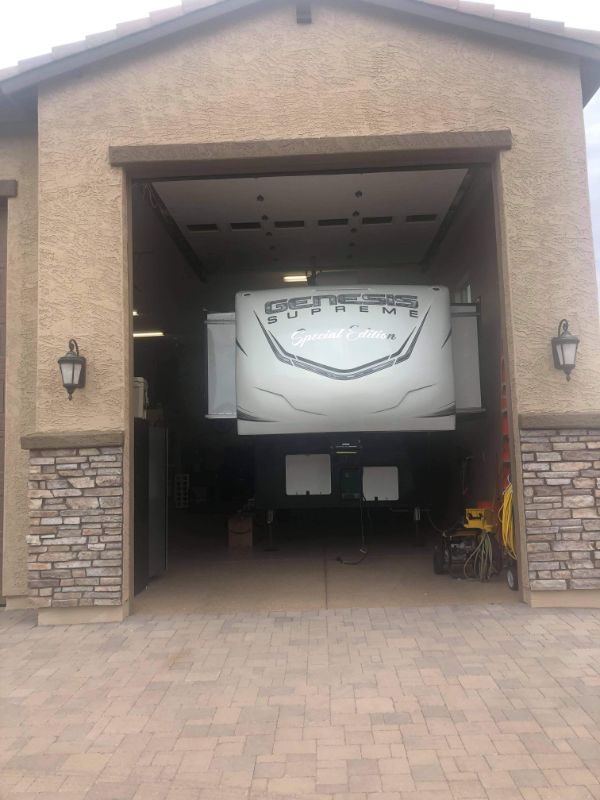
Custom structures offer your RV the most protection and security. Custom RV structures range from roof only to fully enclosed garages built specifically to your needs. RV storage or boat storage is something some prospective home buyers value. They are expensive but avoiding paying storage fees and adding value to your home provides return on your investment.
RV Carports
A standard RV Carport is roof only. Depending on your needs and wants, these units can be customized with full or partial side walls. Versatube will ship a pre-engineered carport kit to your residence for DIY assembly.
Pros
- Depending on the size of your RV, you can expect to pay anywhere from a few thousand dollars to well over $10K.
- Protects your RV from hail, UV rays, leaves, snow and rain.
Cons
- Limited protection from the elements. Since RV carports typically have exposed walls, your RV isn’t 100% protected from the elements.
- Carports need to be installed on a solid base. This may require additional grading, concrete or gravel to be installed.
RV Lean-To
RV Lean-Tos are basically two-thirds of a carport built onto an existing structure like a house or a garage. Using an existing structure for one of the walls reduces your overall cost and allows the lean-to to be secured to a structure for more stability. We considered this option when we added our RV storage but given the mild climate, the investment wasn’t worth it for us.
RV Garages
This is probably not the investment you want to make if you have a hand me down pop up camper from your grandpa. These are the ultimate in RV storage and great potential for a “man cave”. Fully enclosed, utilities and pretty darn expensive. However, if you made a significant investment in your RV, plan on staying in your house for a while or just want a place to hide once in a while these are a great solution.
Pros
- Full protection from the elements.
- They look fabulous. I don’t just throw the word “fabulous” around. I have major “storage envy” every time I pass by one and I don’t even have the need for storage.
Cons
- Expensive – The cost on these really depends on what type of material you are
- using. You can expect to fork out at least ten grand for the most basic RV garage and go up from there.
In Your Yard
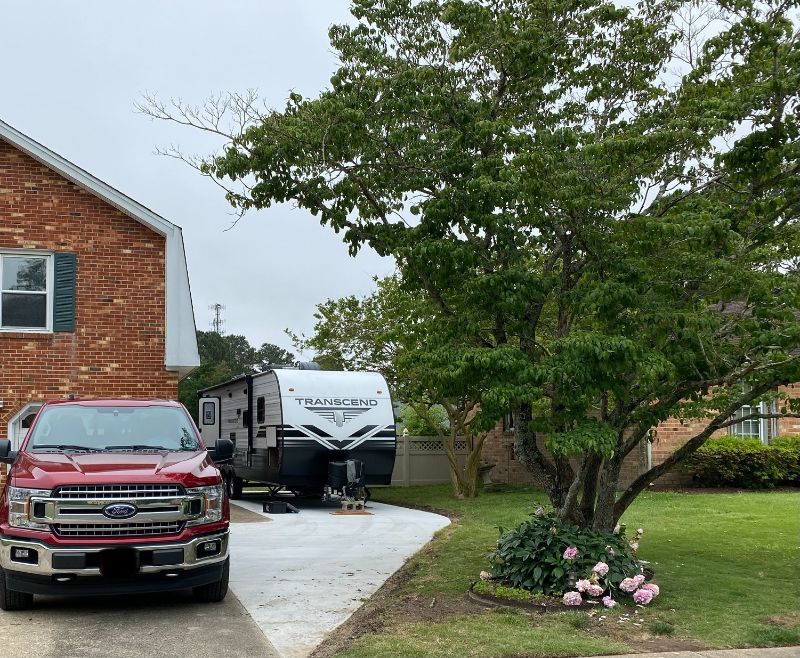
Storing your RV in front of your house, “Cousin Eddie” style sounds great but may not be a viable solution. It’s close, it’s free but it may not be allowed. HOAs and city ordinances may prevent you from keeping your RV so close to home. We ended up adding concrete and additional fencing to our side yard for our RV storage. We didn’t have room or the finances for a garage, carport or lean-to. Basically, my wife said “no.”
Pros
Safety – It was highly unlikely anyone was going to attempt to steal our RV behind our locked gate, next to our house with our dog on patrol.
Close – Preparing for and returning from a trip at the campground is so nice when your RV is stored at your house. Doing modifications and upgrades is much easier when your tools and your RV are close by.
House Guests – We served as a perfect landing spot for friends on their way to their annual beach trip. Once we had the trailer at the house it was even better. They say houseguests are like leftovers and you should throw them out after 3 days. Having a separate living space extends this rule to at least 4 days.
Cons
Not Allowed – City ordinances and HOAs may not allow RV storage at your house or may have storage requirements. For instance, at our last house RVs needed to be half in and half out. Meaning, you could store your RV on the side of your house but only half of it could go past the front of your house. Seriously, who decides these rules? I’ve found that many cities allow you to store your RV in your driveway for 24 hours. This is basically to accomodate packing and unpacking from a trip. Be sure you’ve verified storage rules with your HOA and city ordinances before making such a big purchase. Just because your neighbor has their’s parked out front, doesn’t mean it’s allowed.
Cost – Storing your RV at your house may require an investment in concrete, fencing, permits, etc. You may not see a return on this investment other than cost avoidance of paying for off-site storage.
RV Storage Site
Don’t let your inability to store your RV at home keep you from getting one and enjoying the great outdoors. Our RV storage site worked great for us. It was within 5 miles of our house, only ran us around $100 a month and quite frankly we didn’t have anywhere else to store it. We even got some great lessons on how to successfully back up our trailer as a husband and wife team without hating each other. That my friend, was worth the monthly cost.
Storage sites can be as simple as a parking space, carport or as advanced as fully enclosed storage. It just depends on your needs and what you are willing to pay. Be sure to check reviews, safety measures (cameras, security, etc.) when choosing a storage site.
Pros
- Alternative location – Yes, you can still own an RV even if you don’t have anywhere to store it.
- Security – You can expect to find locked gates, fences, cameras, etc.
Cons
- Not close to home – Have you ever just kept watching a show you didn’t enjoy because the remote wasn’t right next to you? This is what storage does to RVs.
- Cost – Depending on the type of storage you choose, you can expect to pay from $100 – $400 per month.
- Security – Wait, this is a pro and a con? I joined a Facebook page dedicated to reporting stolen RVs. It seemed to me, every time someone reported one stolen it was from an RV storage site. Sadly, poorly secured storage locations are a prime target for RV thieves. Gates are left open are left open or gate codes are not protected. If you choose to store your RV at a storage site, you should take additional security measures to secure your RV. Check out this article I wrote on preventing RV theft. This way, when thieves are casing the joint they just stroll right past yours.
Campgrounds
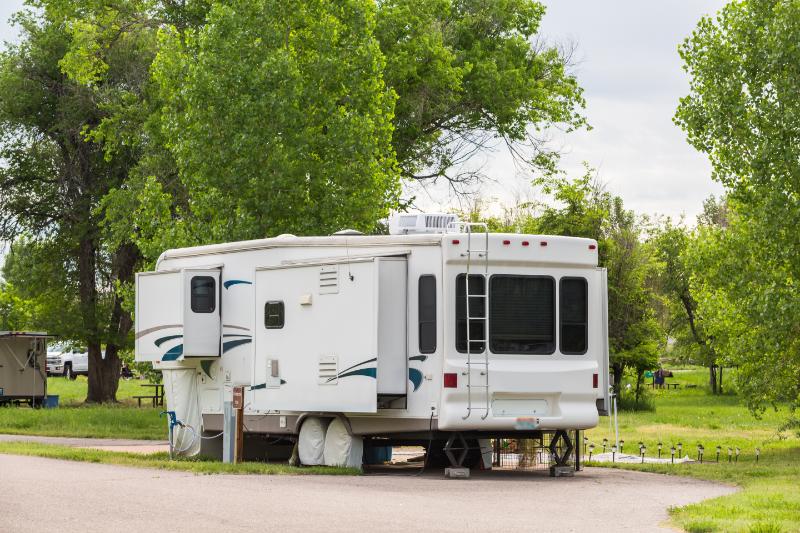
Many campgrounds offer season sites, storage lots or a hybrid of the two.
Seasonal RV Sites – Campers get a reduced seasonal rate to keep their RV at a specific campsite. Instead of you bringing your camper to the campground, it is there waiting for you when you arrive.
Pros
- Limited Towing – Travel days can be rough. It’s a lot of work setting up and breaking down camp. Especially with four kids in tow.
- Best Spots – We stay at a lot of Thousand Trails locations. 99% of the time the best sites are occupied by seasonal campers.
- Decorating – You can go full “Martha Stewart” at a seasonal RV site since you’ll be there a while. I’ve seen full decks and gardens throughout our travels at some of the seasonal sites.
Cons
- Variety is the spice of life they say. When you choose this option you are limited to one campground at least for the season.
- Just like a gym membership, you pay your fees whether you go or not.
- Some seasonal sites require the owners to cut their own grass and trim the weeds. Dang, do you want me to work check in too?
Campground Storage Lots – I’ve seen these used in two different ways at campgrounds. Besides storage only, RV owners make reservations and the campground moves their trailer to a designated site. You can pay a little extra to have them set up your utilities.
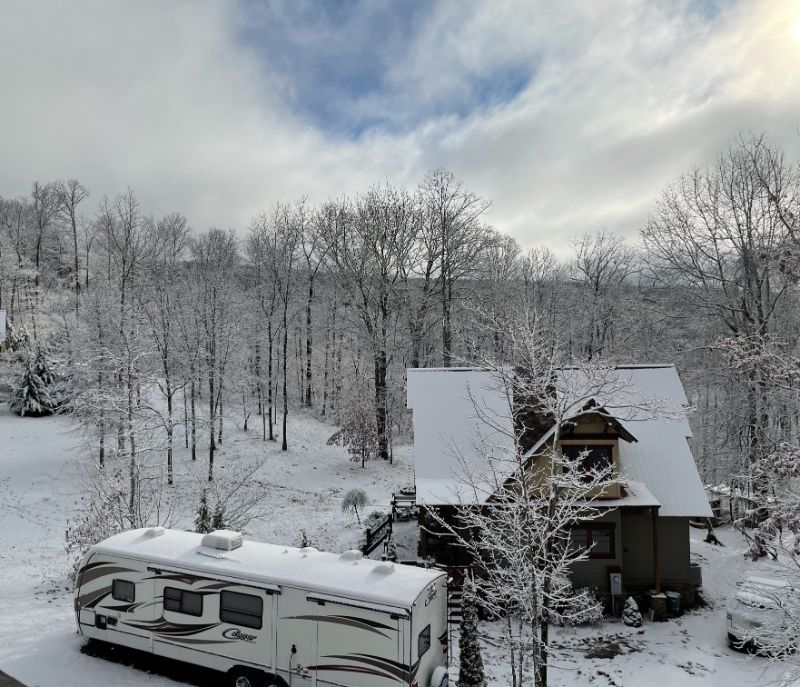
RVs are an awesome way to explore the country, share time with loved ones, all without having to sleep on the ground. Finding your perfect and legal RV storage solution shouldn’t scare you out of RV ownership. Research and budgeting will help you find an RV storage solution that works best for you.
Full-time RVer, husband, father, son, brother, friend and dreamer. I am officially “living the dream:” traveling the country with my amazing wife, four awesome kids, and beloved boxer in our 150-sf RV. Each day we are learning, laughing, (maybe a little yelling) and finding the good in this world.
-
Michael Huffhttps://changingears.com/author/michael-huff/
-
Michael Huffhttps://changingears.com/author/michael-huff/
-
Michael Huffhttps://changingears.com/author/michael-huff/
-
Michael Huffhttps://changingears.com/author/michael-huff/




